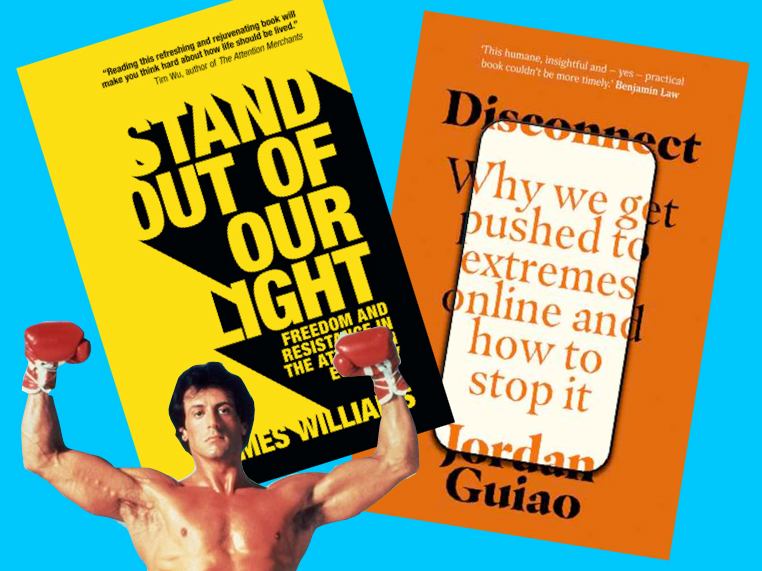
I read some absolute gems.
I’m a firm believer that a good book can change your life. This is why I make time to read every day.
As Australian actor Francis Greenslade advises in his book How I Learnt to Act:
“Read novels and plays and poetry. Read everything. I can’t stress this enough. Reading gives you so, so much. The more you read, the more new ideas you absorb, and the more new situations you experience . . .
The more you read, the greater your powers of concentration. What’s even more beautiful about reading is that it puts you into the head of someone else. It forces you to abandon your view of the world and take on anothers. In other words reading gives you empathy . . .
And it’s never too late to start. Read a book and you’ll become a better actor. But Snapchat and glossy magazines and online games – they don’t give you anything.”
1. Dopamine Nation: Finding Balance in the Age of Indulgence by Dr Anna Lembke
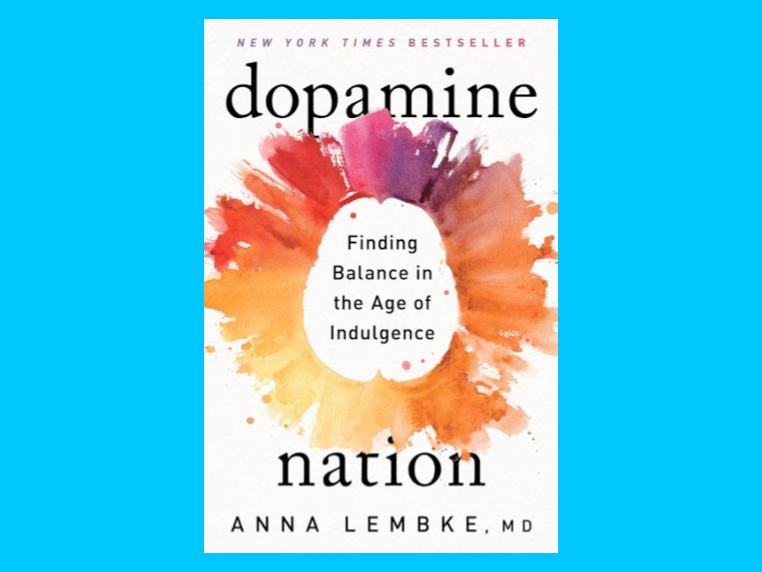
In Dopamine Nation Psychiatrist Dr Anna Lembke argues that in the modern world most of us are running from pain. Whether we’re numbing ourselves with drugs, bingeing on Netflix, gambling, or compulsively shopping online, we’re “distracting ourselves from ourselves”. Lembke states:
“The reason we’re all so miserable may be because we’re working so hard to avoid being miserable.”
Dr Lembke shows readers a path to living a more authentic and fulfilling life.
Spoiler alert: the good life isn’t about having whatever you want, whenever you want. It’s about embracing the discomfort of the present moment and giving our dopamine receptors a chance to regenerate.
2. Stand Out of Our Light: Freedom and Resistance in the Attention Economy by James Williams

Ex-Google strategist turned philosopher James Williams has written a brilliant book on the importance of reclaiming your attention and fighting back against the persuasive techniques used by the attention economy (i.e., big tech companies).
This book helped me to clearly see that the goals of big tech companies are not aligned with my personal goals. These companies do not have our best interests at heart. Williams argues if you want to be truly free and reclaim your capacity to think, you need to extract yourself from these machines of industrialised persuasion.
3. Stolen Focus: Why You Can’t Pay Attention – and How to Think Deeply Again by Johann Hari
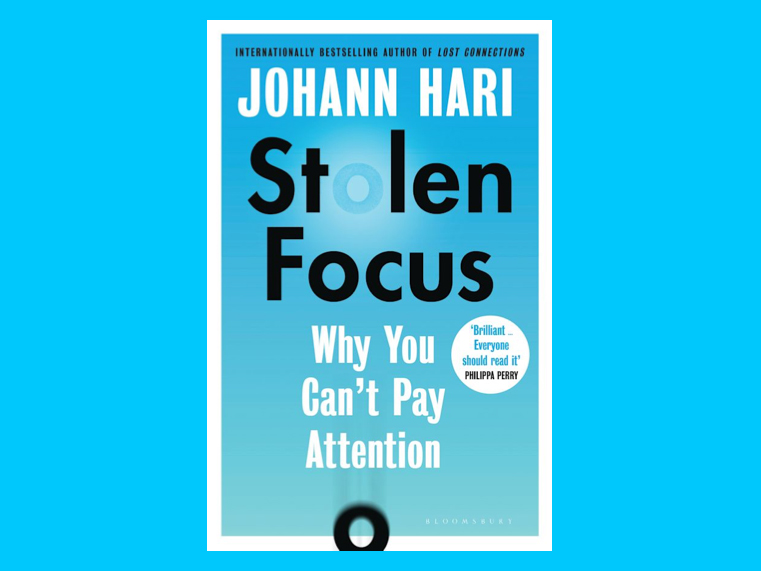
Johann Hari deserves an honorary doctorate for this literary masterpiece. In Stolen Focus, Hari travels the world interviewing experts to understand why our ability to focus has degraded and what can be done about it.
This is a complex, multipronged problem. Hari argues that we need systemic change to solve this crisis of attention (individual action won’t cut it). And this crisis of attention desperately needs our attention. If we stand any chance of solving the major issues we currently face (e.g., climate change), we need to build a social movement to reclaim our attention.
4. Mindful Self-Discipline: Living with Purpose and Achieving Your Goals in a World of Distractions by Giovanni Dienstmann

Being self-disciplined is the key to achieving your goals. But with just one click, you can get sucked into a world of instant gratification. How can you cultivate greater self-discipline in the age of distraction?
Giovanni Dienstmann has thought deeply about this question. In Mindful Self-Discipline he explores the many aspects to cultivating self-discipline. Topics include avoiding the trap of easy dopamine, creating a focus-friendly environment, letting go of unfair comparisons, and cultivating time awareness. This is the best self-help book I have read in a long time. I highly recommend it.
5. Time Wise: Powerful Habits, More Time, Greater Joy by Dr Amantha Imber

I’m a little sceptical of most productivity and time management books, but I enjoyed reading this book by Dr Amantha Imber. It’s a collection of strategies gathered from her popular podcast ‘How I work’.
I particularly liked the strategies presented to deal with addictive technology.
Some of my favourite strategies included:
• Putting rubber bands horizontally across your phone screen: this acts as a physical barrier to checking your phone.
• Solitude deprivation: Having time to be alone with your thoughts (no inputs from technology). This involves planning when you want to receive inputs from your phone and other devices.
• Creating stopping cues: Social media companies use strategies to keep you scrolling and clicking. To combat features like the infinite scroll, you can create your own stopping cues (e.g., having a set time to log off).
6. Move the Body, Heal the Mind: Overcome Anxiety, Depression, and Dementia and Improve Focus, Creativity, and Sleep by Dr Jennifer Heisz by Dr Jennifer Heisz
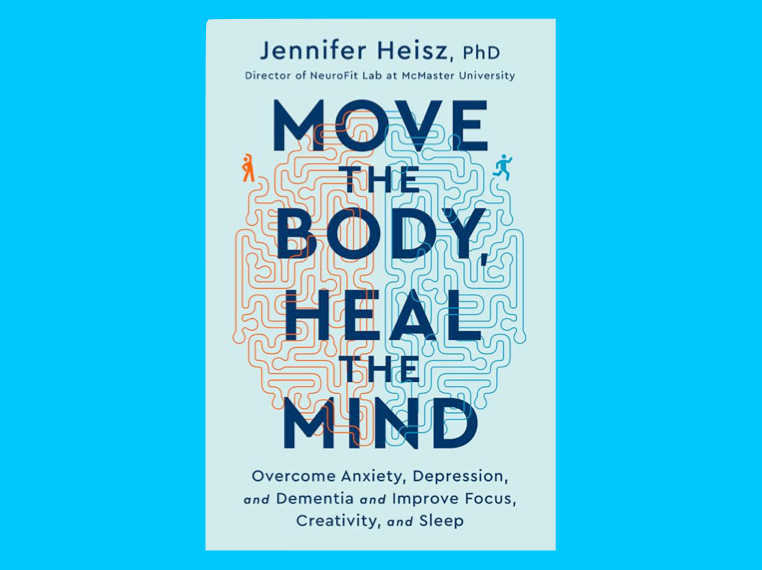
Over the years I’ve read a lot of books on the benefits of exercise but this book tops the list!
Neuroscientist Dr Jennifer Hiesz does a superb job presenting the science behind what exercise does for brain health, mental health, and preventing dementia.
Reading this book was like having a light bulb go off in my head. It gave me a deeper appreciation of exercise and how it has helped me to reduce anxiety, keep depression at bay, enhance my focus, and get through challenging times.
7. Disconnect: Why We Get Pushed to Extremes Online and How to Stop it by Jordan Guiao
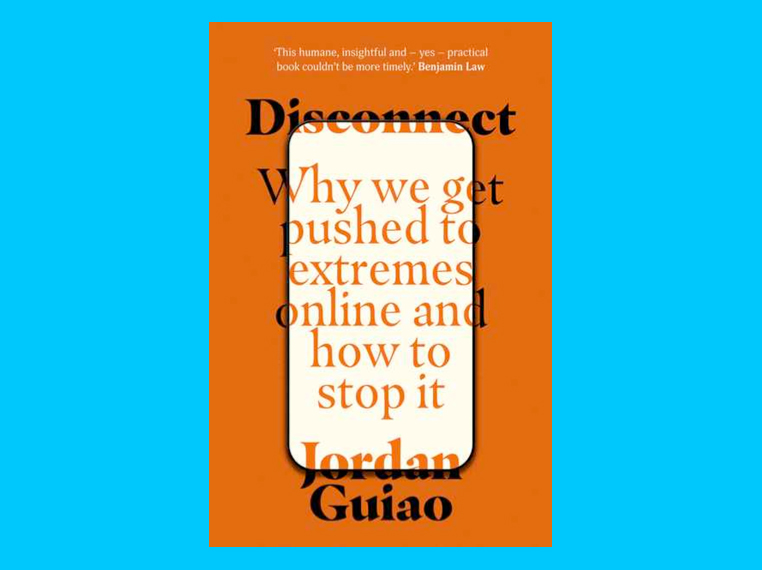
This year I have had more conversations with people who believe in conspiracy theories than in the previous 10 years of my life. It’s alarming. How did we get here?
If you know someone who has fallen down conspiracy theory rabbit holes, this book will help you understand how this happens and what you can do to help your loved ones. Guiao also explores a number of other Internet related issues including social media narcissists, naïve futurists, hateful trolls, and dating app pests.
So, there you have it! Those are my favourite nonfiction books for 2022. They were packed full of life changing strategies and wisdom. I’m grateful to these authors for sharing their ideas with the world.
What books did you enjoy reading this year?
I’d love to hear your recommendations.
Share This:
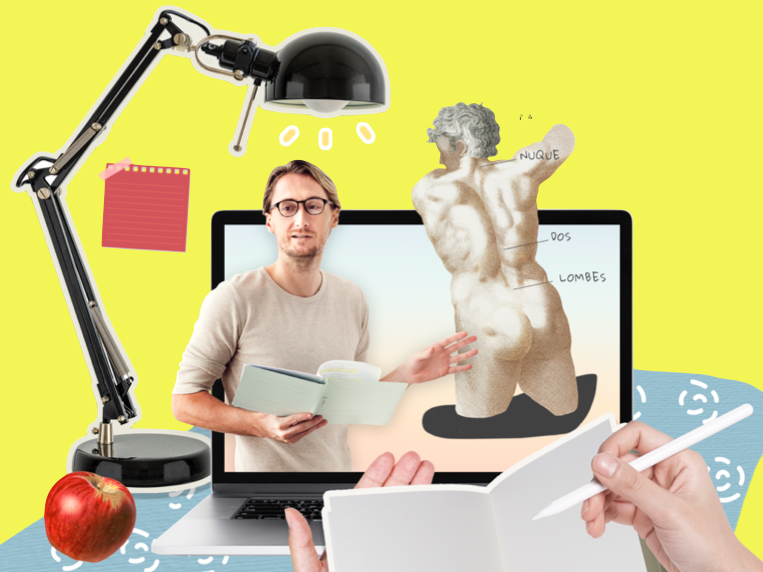
The thing is I’m constantly learning.
So, my ideas come from a lot of places. They come from documentaries, books, online courses, journal articles, the media, being out in the world and interacting with different people and places, audiobooks, and podcasts (just to name a few).
Every day, I set aside time to learn something new. Some days it will just be 15 minutes but I figure, it’s something. And learning something is always better than learning nothing.
Thanks to learning a little bit each day, I’m not the same person I was 10 years ago or even 10 days ago!
What I usually find is when I learn about a new topic, some aspect of my life improves. My mental landscape transforms. I experience a mindshift.
In her book Mindshift: Break through obstacles to learning and discover your hidden potential Dr Barbara Oakley states a mindshift is a deep change in life that occurs thanks to learning. That change can result from learning new skills or changing careers but also from changing your attitudes and relationships.
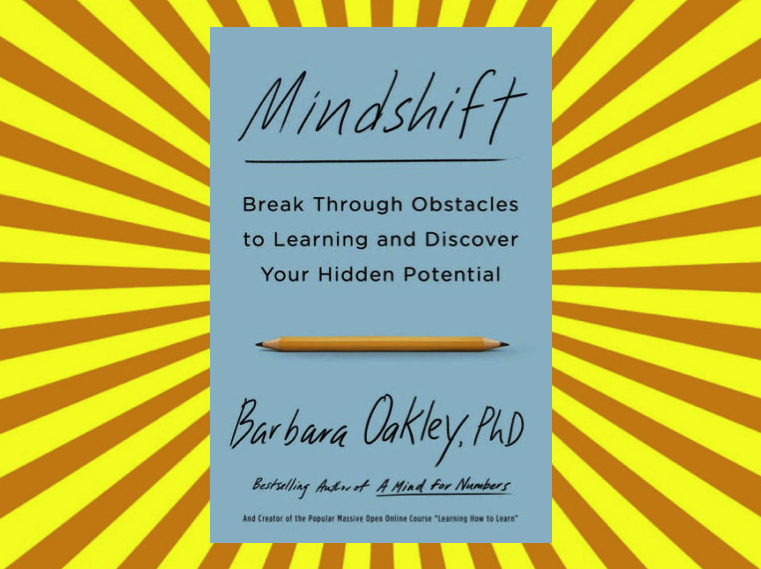
The thing is you’re never too young or old to experience a mindshift. You also don’t need to spend a lot of money (if any) to do so.
You see, there is no shortage of free or cheap information available online.
The challenge is sifting through all that information to find the good stuff.
The challenge is making the time to learn how to learn and deeply learn that information.
The challenge is getting comfortable with experiencing discomfort as you try to learn.
But becoming a lifelong learner is well worth the time and effort. Through the process of showing up to learn new things, you become more agile and mentally flexible. Life becomes more interesting and you do, too.
If you want to learn new things without formally enrolling in a university degree, here are my top tips for being a lifelong learner on a budget.
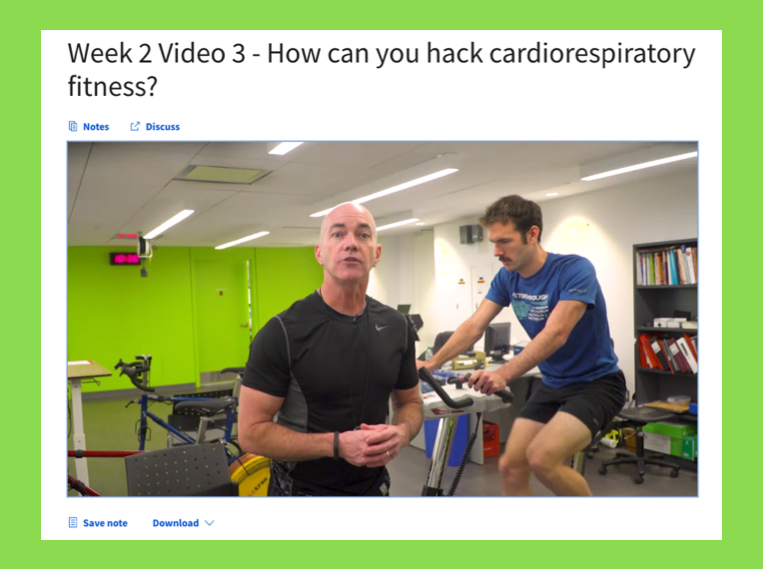
Thanks to the world of MOOCs, you can study at some of the best universities around the world without having to leave the comfort of your own home and spend any money.
To access MOOCs, you’ll need to have Internet connection, a notepad and pen. But that’s about it.
I recently participated in a fabulous free MOOC from McMaster University called Hacking Exercise for Health. This four week course was delivered by two exercise physiologists Dr Martin Gibala and Dr Stuart Phillips.
The course was packed full of cutting edge research on how to optimise cardio and resistance training as well as lots of practical tips. By the end of the course, I was able to devise my own workout programs.
This created a mindshift. How? Instead of paying a personal trainer to devise my workouts and paying for an expensive gym membership, I can now be my own trainer at home. This MOOC has just saved me a lot of money.
How can you find MOOCs that are a good match for you?
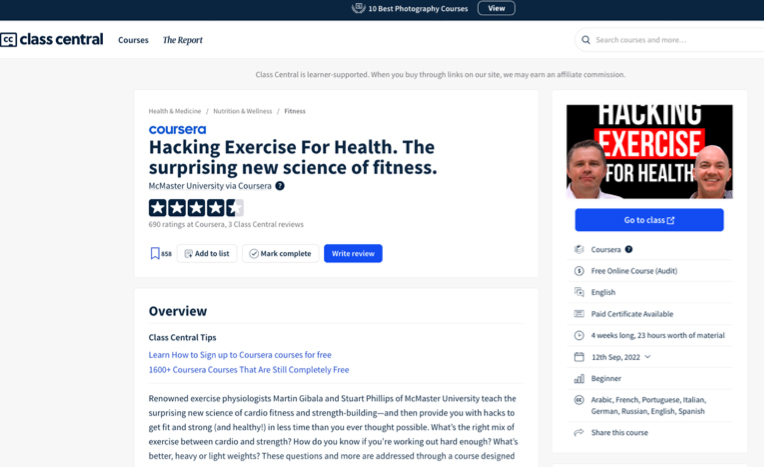
I recommend checking out Class Central. This is a website that provides ratings, reviews, and information on MOOCs. It will help you to select a MOOC that will best fit your needs.
If I’m interested in an expert’s work, I will check out their website. An academic’s website lists all their published academic papers but it also usually lists podcasts, books, talks, and radio interviews they have done.
For example, Dr Barbara Oakley’s website contains links to her upcoming public events, research papers, books, talks, and media appearances (e.g., podcasts and radio interviews).
If you find the person’s academic papers challenging to read, start by exploring interviews they’ve done and videos of their talks.

Books can change your life for the better. And libraries are full of life changing books that you can access for free.
I frequently go on book binges at my local library where I max out my library card. What have I got to lose?
If I don’t like a book, I can just stop reading it and move onto reading something else. At the end of the day, it costs me nothing.
If a book isn’t in your local library collection, ask the librarian if they can order it in on inter-library loan. You can also see if they will consider purchasing the book for their library collection (hey, there’s no harm in asking).
Over the last few years, I have saved hundreds of dollars as a result of my local library purchasing books that I have requested.
University libraries contain books that you wouldn’t normally find in your local community library. Anyone can go into a university library and look at the books.
Depending on the rules, you may not be able to take out a book, but you can photocopy a section from it or find a comfortable chair and start skim reading.

I recently decided I wanted to start running to improve my fitness. But I had no idea where to start. I hadn’t run long distances since doing cross country at school! I thought perhaps Reddit may have some useful ideas and advice.
On Reddit, I found several threads where people shared great advice, tools, and strategies for beginner runners (e.g., C25K program, run one song and then walk one song, useful stretches to do before you head off on a run, timer interval apps, etc).
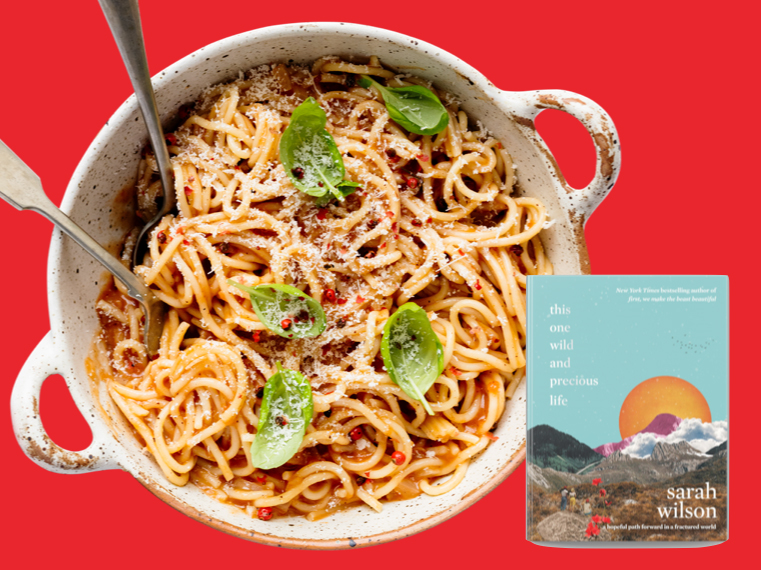
Before Covid hit, a group of friends and I would meet for dinner to discuss issues relating to the climate crisis. We would select an article or book to read before the dinner. Then, everyone would bring a dish to share and the reading material would form the basis for the dinner discussion.
These dinners were a nice way to connect with my friends on a topic that we were all concerned about. They also provided extra motivation to learn about challenging topics. If I’m hosting a dinner discussion, I better have read the article or book before my friends arrive!
Due to Covid concerns, my friends and I haven’t had a dinner discussion in a little while. But as the weather warms up, I’m hoping to host one of these events outside. There’s also the Covid safe option of meeting on Zoom.
There is no shortage of information or opportunities to expand your world through learning. Like anything in life, it’s about prioritising what’s important to you. Could you spend 20 minutes a day or one hour a week learning something new? And what would your life be like in 6 months’ time if you did?
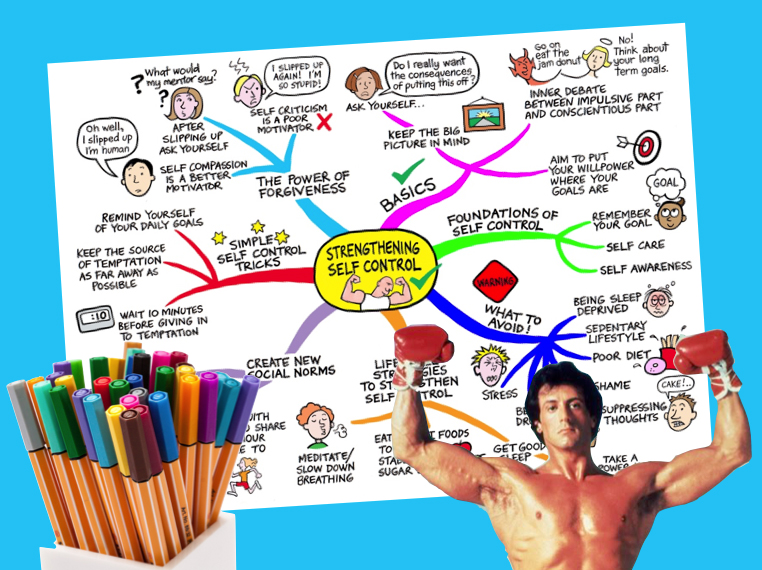
The funny drawings, the colour, and creativity can transform any dry subject into something that’s interesting for the brain.
But mind mapping is also a great life strategy. You can use it to create plans, capture ideas from books, set goals, clarify your thinking, organise your finances, and work your way out of messy situations.
Below I explore some different ways you can use mind maps in your day-to-day life.

Do you ever read books and then feel frustrated when you can’t remember much from them?
This is why I mind map out every non-fiction book that I read.
I know that there are limits to my memory. If I want to be able to extract ideas and strategies from a book and apply them to my life, I’m going to need to create mind maps.
There are two ways you can mind map a book:
1) You can mind map as you read: this forces you to slow down and really think about the ideas. I highly recommended doing this if the content is really complex. But this approach can be slow going!
2) You can mind map once you’ve finished reading: I use mini post-it notes to tab key ideas as I read. Once I’ve finished reading the book, I go back and mind map out the tabbed ideas. This way I have some perspective and can identify what’s important and what’s not (rather than assuming every sentence is important and needs to be mind mapped).
After I’ve finished mind mapping the book, I select a strategy that I’ve captured on the mind map to test out.
My husband has always been amazed at how I can take ideas from books and apply them to my life. But there’s no magic to this. I’m able to use lots of different strategies because mind mapping helps me to understand and remember them.
Let’s face it, if you can’t remember a strategy, you can’t use it!
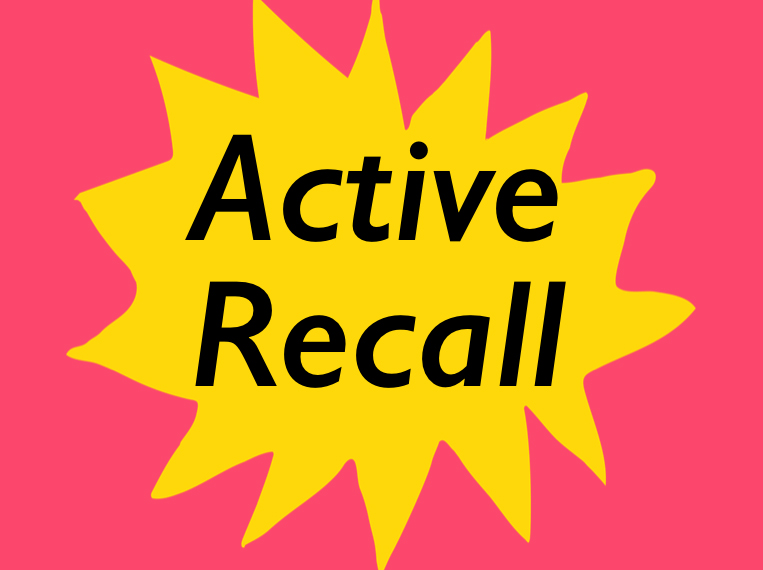
Let’s say you have a test or exam coming up. Here’s how you can use mind maps to effectively prepare . . .
Push your notes and books to the side (you can’t look at them). Now grab a blank sheet of paper. Set a timer for 5 minutes and try to create a mind map on the main ideas you can remember.
Don’t try to make these mind maps look pretty. You’ve only got 5 minutes, so scribble and draw out as much as you can remember.
Once you’ve exhausted your memory, pull out your notes and pick a different coloured pen. Take a look at your messy mind map: What did you get right? What did you get wrong? Where are the gaps in your knowledge?
This strategy is called Active Recall and it’s the most effective way to retain information. You can read more about it here.
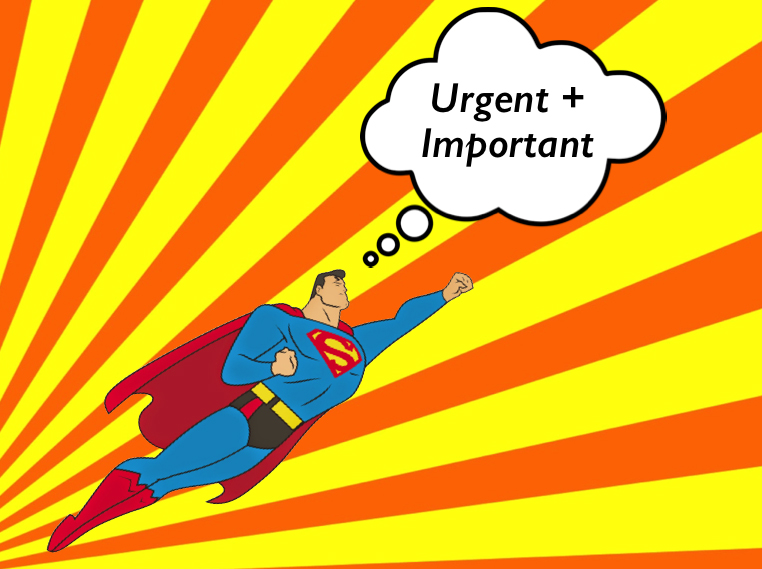
When you feel overwhelmed by life, everything can feel urgent and important. But not everything is urgent and important. A little prioritisation can save you a lot of stress and drama.
Grab a big sheet of paper, draw a circle in the middle, and write inside it Stuff to do. Now get everything out of your head and on to the page!
Once you’ve finished your mind map, look over all the tasks.
If a task is important, give it a tick.
If a task is urgent, circle it.
Focus your energy on knocking off the tasks that have ticks and circles around them (they are urgent and important).
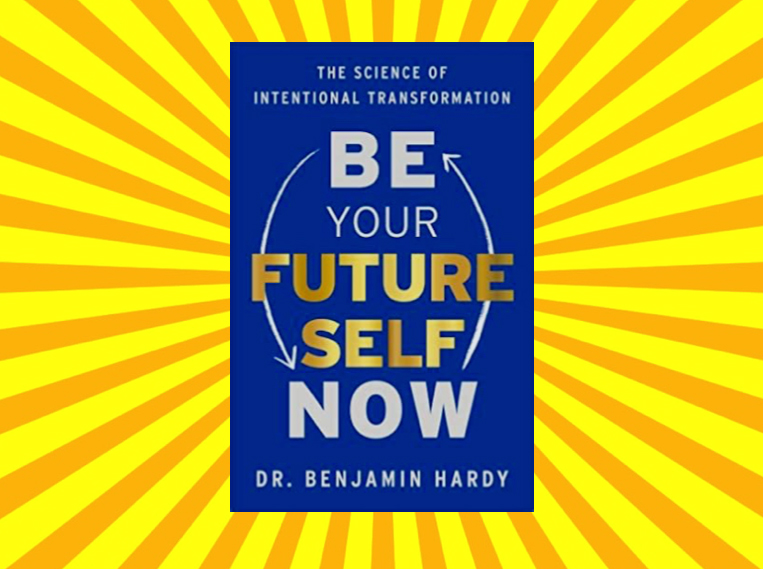
Research shows the more connected you are to your Future Self, the more committed you will be to achieving your goals and the wiser decisions you will make in the present.
Draw a circle in the middle of page and write inside it My Future Self. You can create branches for your Future Self in:
• 3 months’ time
• 6 months’ time
• 1 year’s time
• 3 years’ time
• 5 years’ time
Then off each of these main branches, write down your goals. What do you want to have accomplished by this time?
As Dr Benjamin Hardy states in his book Be Your Future Self Now:
“The clearer you are on where you want to go, the less distracted you’ll be by endless options.”
Note: Imagining your Future Self is not an easy thing to do. We are terrible at imagining where we are going to be in the future. So, don’t overthink it. Just get some ideas down on paper. As you gain more clarity around your goals and values, you can always add extra branches to your mind map.
I’ve found mind mapping to be a fun and effective way to capture, organise, and retain information. Even if I never look at the mind map again, the process of getting ideas down on paper makes a big difference. It helps me to feel more in control and on top of things.
If you need some clarity in a particular area, stop ruminating. Pick up a pen and start mind mapping!
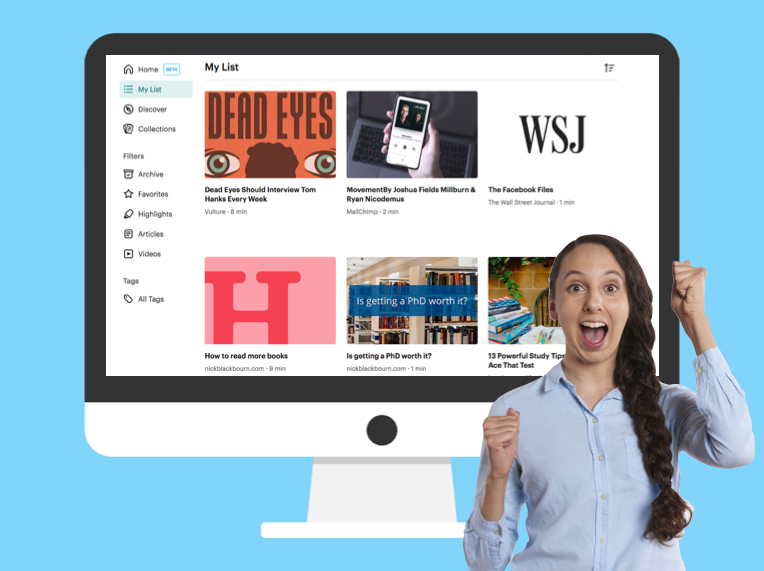
How do you do it without getting derailed by a tsunami of ads, click-bait, notifications and hyperlinks?
Your brain is up against many carefully crafted apps and video games that are designed to steal your attention.
This article is about how you can read online without ending up places you never intended to go.
I’m going to share strategies and guiding principles that help me to stay focused when I’m reading on a screen.
Let’s face it, we all need help with this. The temptation of fun apps and websites are only a few clicks away! But you only have so much mental energy. You need to know how to harness it and direct it towards the things that really matter.
I won’t deny it. I like being able to hold books and articles in my hands. This is why I buy a lot of books and get the Guardian weekly delivered to my door.
Being able to easily scribble down questions and draw pictures in the margins helps me to learn and understand the material.
If the information is really important and/or complex, I highly recommend printing it out. But for all other written works (e.g., blogs, emails, movies or book reviews), try implementing the following ideas and strategies.
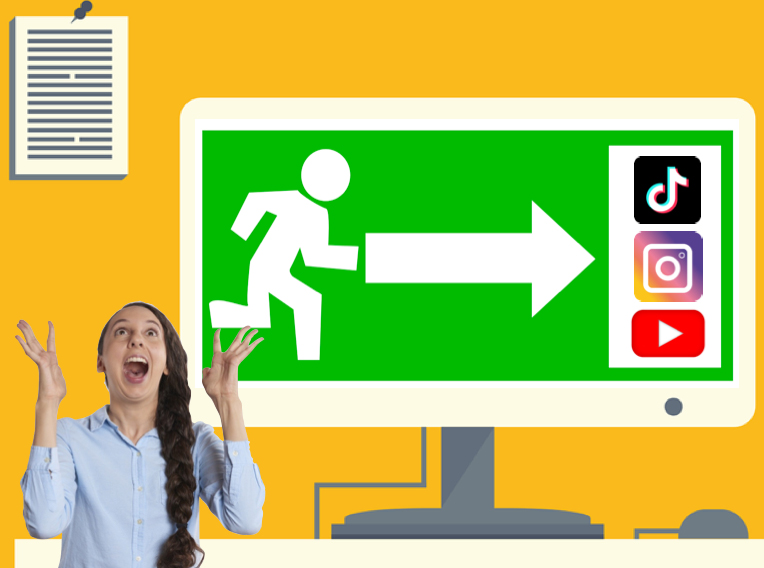
The human brain loves comfort. It loves the familiar.
But reading can be challenging and downright uncomfortable for the brain.
If you’re reading an article on a subject that is completely new to you and/or conflicts with your pre-existing beliefs, your brain is likely to have some kind of adverse reaction. It’s going to be like “What is this?! I don’t like this!”.
You’ll feel the urge to escape from this mental discomfort. Therein lies the problem with reading something online . . .
You have lots of easy escape routes (e.g., social media, YouTube, and Netflix). These escape routes give your brain instant relief and gratification. But they also take you further away from your goals and what you need to do (hello, life regrets!).
Don’t give your brain any room to run. Block the escape routes.
Before you sit down to read, set yourself up for a successful online reading experience. For example, here’s what I do:
• I put my phone on silent and place it in another room
• I activate an Internet blocker app called Freedom
• I clear away any clutter on my desk (I dump it in a box)
• I switch off any distracting music that’s playing (generally anything that contains lyrics)
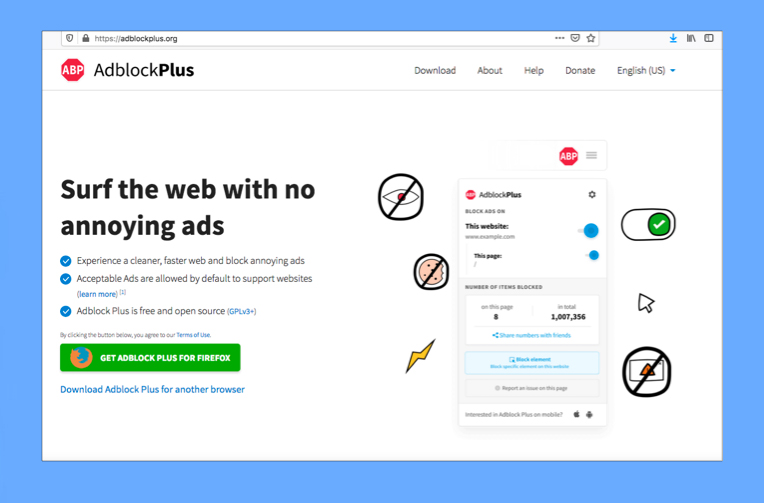
We all know the online world is not the real world. But there’s one irritating feature both worlds have in common: advertising.
The nasty thing about online ads is they are way more targeted (you can thank surveillance capitalism for that!).
Like all advertising, I see online ads as a form of mental pollution. They don’t add anything to your online reading experience, except noise, stress and visual clutter.
Online ads can easily derail your attempts to learn and grow. Plus, they can rapidly deplete your bank balance!
This is why I recommend installing an adblocker plugin to remove ads from webpages, social media and search engines.
Check out AdblockPlus. It’s free and highly effective.
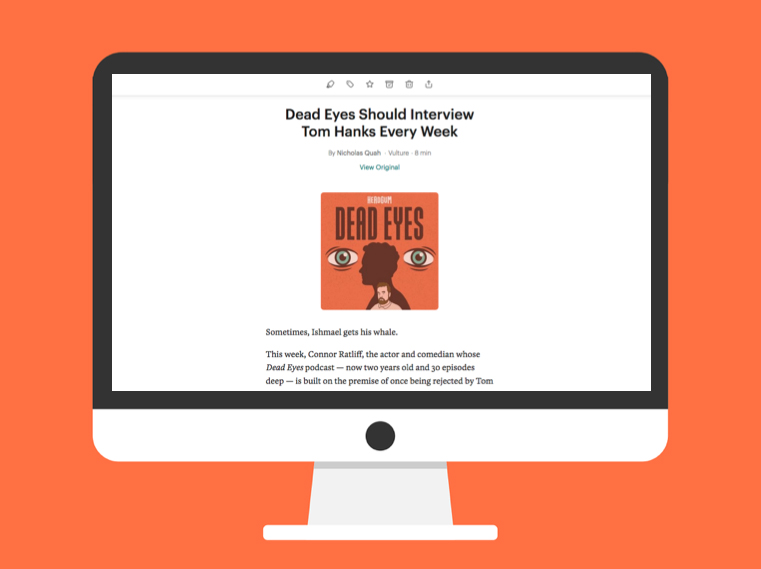
When reading an article, you want to be able to focus on just the content. Most of the time, you don’t need to see side bars, pop-up boxes and other people’s angry comments. This is online clutter that overloads your working memory and depletes your brainpower.
The good news is you can eliminate this clutter by using a free app called Pocket.
Pocket allows you to save articles in your web browser. You can then open the article up without all the other clutter that appeared on the original webpage.
When you open up an article in Pocket, you’ll see a lot of white space around the text. Your brain will say “Thanks!”. Using Pocket makes for a much nicer and easier reading experience.
Take out a notepad and pen and make notes as you read. Not only is it super handy to have something to refer back to but it will help you to understand the information more easily.
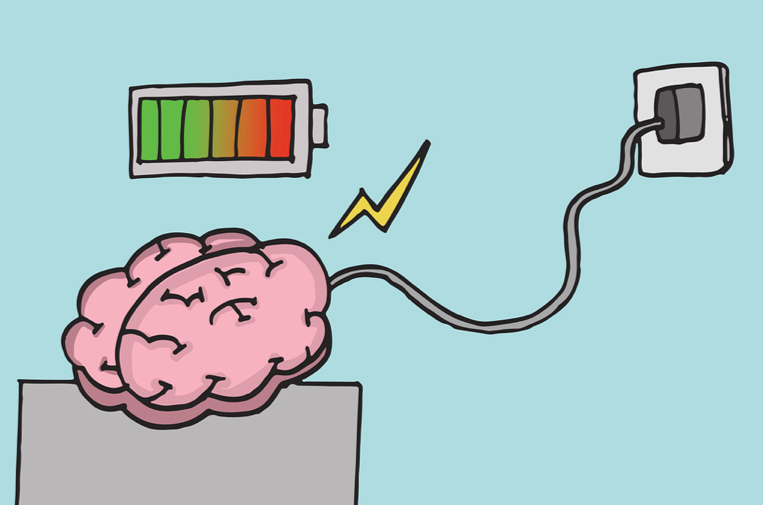
Reading may seem like a passive and ‘easy’ activity. But don’t be fooled. Reading requires serious brainpower.
What can help to supercharge your brain to get through all those articles and chapter readings?
I find two things help a lot:
1) Healthy snacks (ideally, within arms reach)
2) Power naps
Before I get stuck into a serious reading session (anything more than 30 minutes), I will sometimes make myself a little platter with veggie sticks, a dip and crackers.
It’s like the act of preparing the platter is helping me to mentally prepare for the task ahead. I’m also combining something tasty with something that can feel hard (i.e., reading). This seems to make the task of reading a complex article a little more pleasant for my brain.
As for the power naps, I typically use these to recharge my brain after reading academic papers.
It’s hard to absorb ideas and learn skills when you’re feeling exhausted. This is why I take power naps and prioritise sleep. It’s not a smart idea to try learning anything new late at night. You’re not going to remember very much.
Hit the sack and commit to waking up early and doing a little reading first thing in the morning.
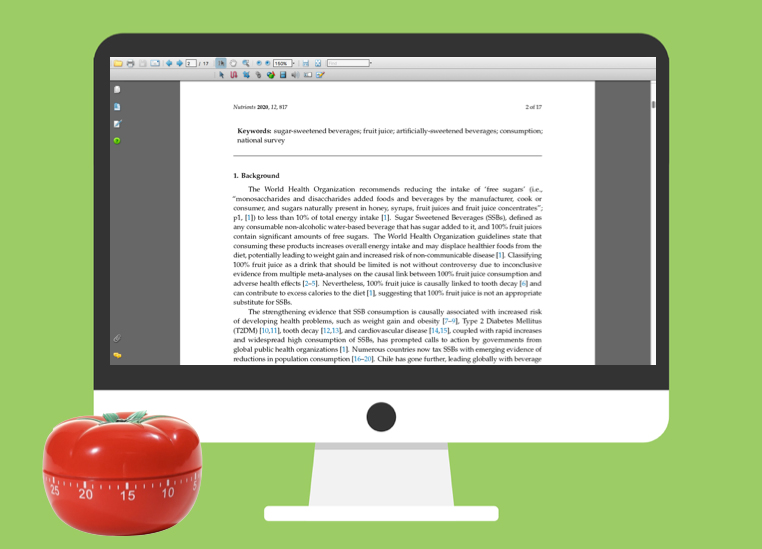
Decide on how long you’re going to read for. Then set a timer and go! Give the articles your full attention for this period of time. I find 25 minutes is a good amount of time for focused reading.
After sitting and reading for 25 minutes, I like to get up, stretch and look out a window to give my eyes a rest.
If you want to be able to remember what you read on a screen, you need to be able to focus your mind. You can’t be jumping around all over the Internet.
But this is not how most of us read online. We skim and scan pages, click and scroll. Like a poker machine, the Internet has trained us to be on the look out for anything that it going to light up the reward pathways of our brain.
You need to appreciate that reading a chapter isn’t going to instantly light up your brain in the same way that social media is designed to do. This is why it’s so important to set yourself up so you can read deeply and get to the end of an article. And if you made it this far, well done!
Dr Jane Genovese delivers interactive sessions on learning to learn, combating procrastination, exam preparation, how to focus in the age of distraction, habit formation and much, much more!
Get FREE study and life strategies by signing up to our newsletter:
© 2024 Learning Fundamentals